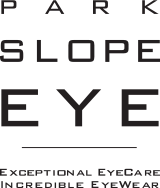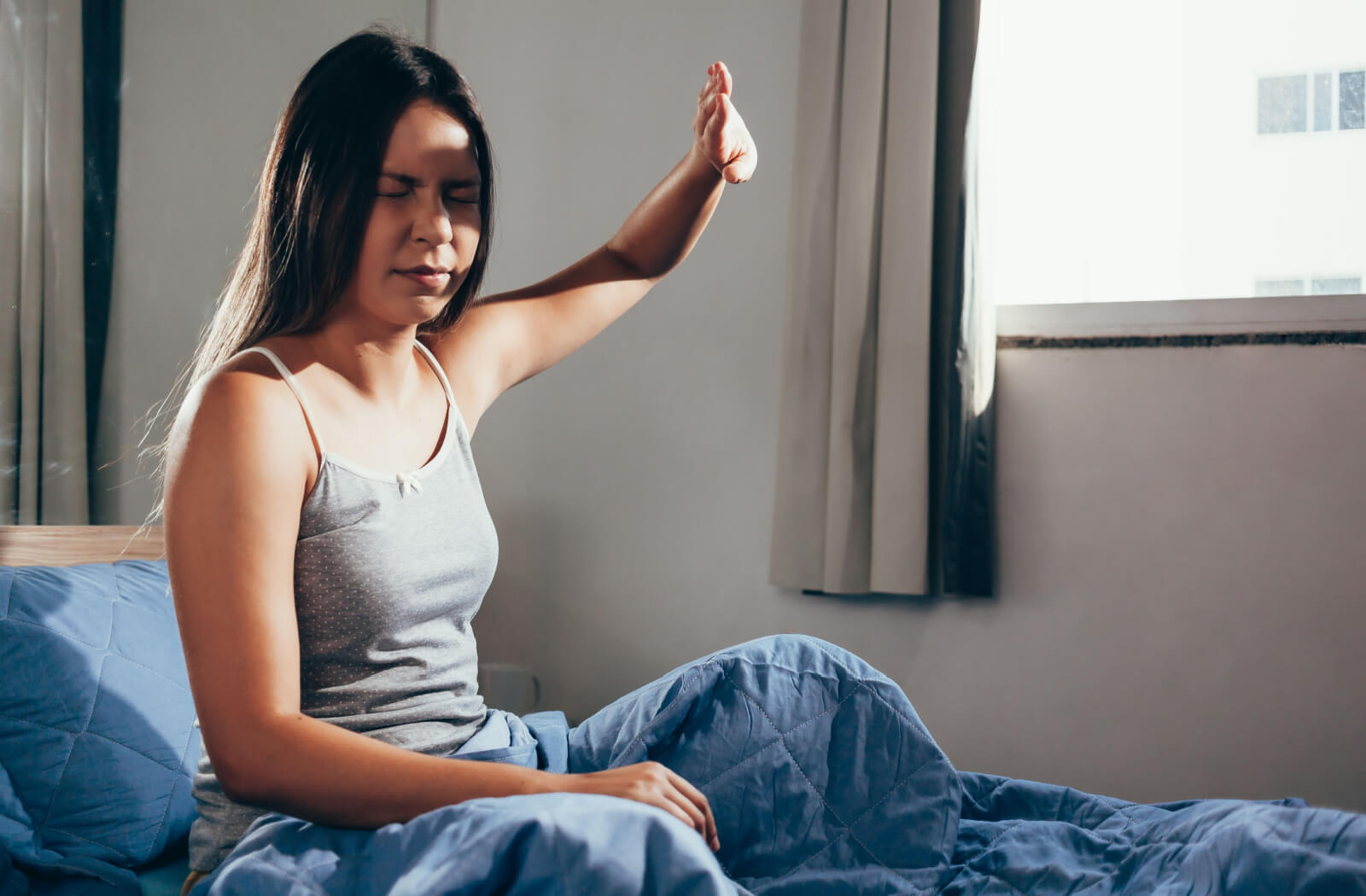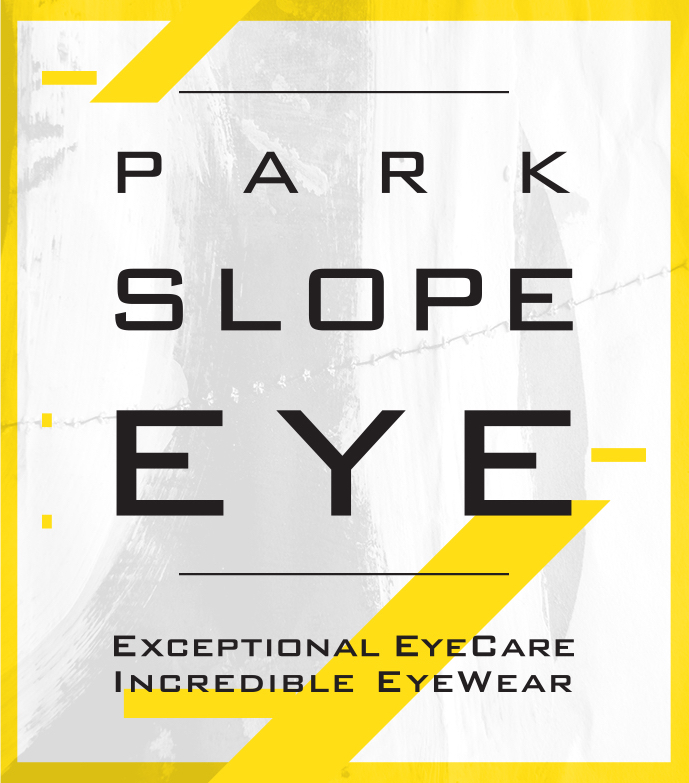Dry eyes can be very noticeable and often very bothersome—there’s not much worse than starting your day with them. When your dry eyes are more than just a sign of fatigue, an eye exam can identify what underlying problem may be. Most likely, dry eye disease is the reason behind your dry eyes when you wake up.
Tears that don’t properly lubricate your eyes are a part of the problem, but not the only reason your eyes are dry, especially if you’ve just woken up.
Reasons Behind Dry Eyes
Most likely, dry eye syndrome is the reason for your dry eyes. Every year, millions of Americans experience dry eye disease (also known as dry eye syndrome). Complications with the oil, aqueous fluid, or mucin layers of your tear film are often the cause of dryness.
The surface of your eye is kept clean by your tears, but when issues develop, inflammation, irritation, and other dry eye symptoms result. Dry eye disease can be broken down into 2 main causes: decreased tear production or increased tear evaporation.
What Is Decreased Tear Production?
When your eyes don’t make enough tears to keep themselves wet, you may have decreased tear production, sometimes referred to as aqueous-deficient dry eye. Vision issues, discomfort, and redness are all possible effects of this condition.
Age-related declines in tear production make dry eyes more prevalent in people over 60. Your tear production may also be impacted by the following aspects:
- Health issues like Sjogren’s syndrome
- Medicine side effects from antihistamines, decongestants, and antidepressants
- Neuropathic corneal tissue
What Is Increased Tear Evaporation?
Increased tear evaporation happens when there are problems with the lubricating oily layer of your tear film. The oil that is released by glands in your eyelids helps prevent your tears from evaporating, and without enough of it, your eyes ight feel dry.
Other elements that contribute to greater tear evaporation include:
- Irregular blinking, typically because of the use of digital screens
- Wind, smoke, or a lack of humidity
- A lack of vitamin A
- Posterior blepharitis
- Allergies
What Is Nocturnal Lagophthalmos?
Nocturnal lagophthalmos refers to the inability to fully close your eyelids while sleeping, which has been linked to dry eye symptoms and poor sleep quality. 20% of Americans experience nocturnal lagophthalmos, including children.
There are several approaches to treating nocturnal lagophthalmos and related symptoms. An effective and simple treatment is to use ophthalmic ointment at night and eye drops as needed for the accompanying dry eye symptoms.
Taping the eyelid closed while sleeping has also been found to be beneficial, albeit impractical. Using warm eye masks, fragrance therapy, and taking a bath at night to reduce sympathetic activity and increase parasympathetic activity can help minimize nocturnal lagophthalmos.
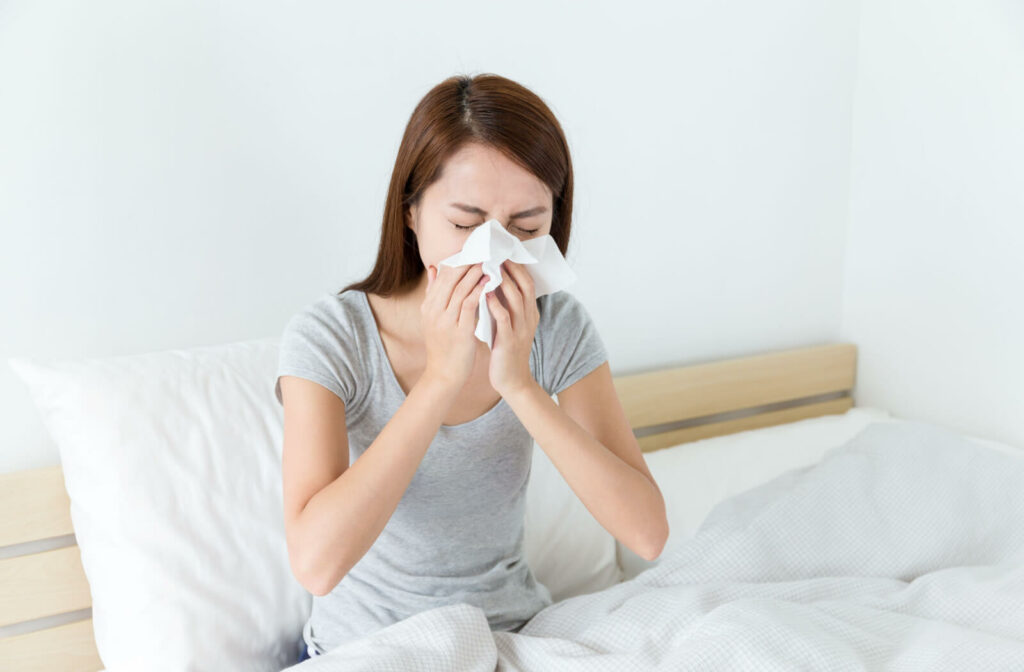
What Are the Symptoms of Dry Eye?
You might suffer from several typical dry eye symptoms, including:
- Eyes that are irritated, stinging, or burning
- Unclear vision
- Feeling like there’s something in your eye
- Having a scratchy sensation in your eye
- Eyes that are inflamed
- Challenging contact lens wear
- Overly wet eyes
What to Do About Dry Eyes
There are many reasons why you might experience dry eyes, even after a good night’s sleep. But the good news is there are ways to treat your symptoms and find relief.
Using Eye Drops to Treat Dry Eye
Eye drops can help provide temporary relief from dry eye symptoms by imitating your tears and moistening your eyes. With many brands to choose from, you can speak with your eye doctor about what type is recommended for your dry eye symptoms.
Prescription eye drops may be recommended for more severe cases of dry eye and will require an eye doctor’s examination.
Using Punctal Plugs to Treat Dry Eye
Rice-sized punctal plugs can help keep your eyes moist for a longer period by sealing the little duct between the upper and lower eyelids where your tears drain. Because your tears won’t drain as rapidly, your eyes can remain moisturized, which aids in the relief of dry eye symptoms.
Using Vitamins to Treat & Prevent Dry Eye
Many vitamins can help alleviate dry eye symptoms and keep them from recurring.
Your optometrist can help identify the right supplements for your needs, whether it’s Omega-3 fatty acids, B-12, or other vitamins.
Making Environmental Changes to Prevent Dry Eye
If your surroundings are contributing to or worsening your dry eye symptoms, your eye doctor may recommend changes to help protect your eyes.
It may also help your eyes if you:
- Avoid smoking, windy conditions, and air conditioning
- Use a humidifier to prevent the air in your home from becoming too dry
- Limit your screen time and take regular breaks
- Wear wraparound sunglasses outdoors
- Consume plenty of water
- Get a full night’s rest and consider wearing an eye mask
There’s No Need to Experience Dry Eyes
While dry eye disease can affect anyone, you don’t have to suffer from the symptoms, especially at the start of your day. Speak with your eye doctor at Park Slope Eye about your dry eyes today, and receive professional advice and compassionate care.
